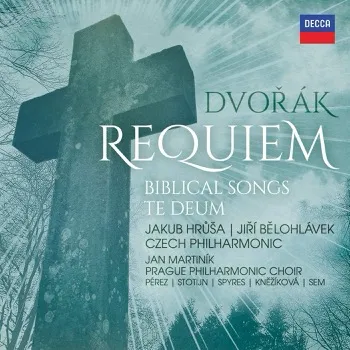The choral music of Dvořák is certainly under-recorded when compared to his friend contemporaries. Why is this? The Requiem was a success at its premiere in Birmingham on October 9, 1891 conducted by the composer, as were several other Dvořák-led performances throughout Europe during the following year. He even chose this work for his November 1892 Boston concert, coming only two months after his arrival in New York to head the new National Conservatory of Music. Perhaps 20th-Century listeners found more to enjoy in the overtly dramatic Berlioz and Verdi settings, especially their vivid depictions of the final judgment. Yet one of the many strengths of this new recording is how well it captures both the reverence and the drama of Dvořák’s setting.

The opening moments of Requiem aeternam signal there is something special in this performance. The Czech Philharmonic strings, beautifully caught by the Decca engineers, produce a dark yet intense color that communicates the upcoming text’s urgent call for mercy. The choir’s first entrance matches the orchestral color and mood: listen from 4’00” to 5’30” as choir and orchestra perfectly capture each new emotional sentiment. There is a fervency here that makes Neeme Jarvi’s recording with the London Philharmonic Orchestra and Choir seem rather perfunctory.
While the “Dies irae” does not have the visceral apocalyptic vision of Berlioz and Verdi, it is nevertheless still quite dramatic, especially as heard here, with powerful brass and lower strings really digging into their lines. It seems worth noting that Dvořák’s Catholic faith was an integral part of his life – perhaps he did not see the day of judgement with the same fear and trembling that Berlioz and Verdi did? Certainly, his “Tuba mirum” (Track 4) does not attempt to elicit overwhelming terror, but rather an uneasy agitation. Likewise, the “Quid sum miser” does plead, but its aching beauty suggests Dvořák knows that the “King of terrible majesty” will answer his cry to be saved.
The soloists are another high point of this recording. Their singing is outstanding, and they are a well-matched quartet. Their performance of “Recordare, Jesu” (track 6) is especially beautiful and uplifting. Hrůša and his soloists are of one mind, and he ensures the accompaniment allows ample freedom to shape their phrases with care and affection. Tenor Michael Spyres spins a limpid legato line, never taxed by many high lying passages, while bass Jan Martiník’s opulent timbre and dramatic delivery is especially impressive.
Related Classical Music Reviews
- Review: “Soirée” – Magdalena Kožená and Friends
- Review: Brahms – A German Requiem – SRSO, Daniel Harding
- Review: Berlioz – Requiem – John Nelson
Hrůša’s conducting deserves special mention. I assume that all this repertoire was meant to be conducted by Jiří Bělohlávek, whose recordings with the Czech Philharmonic over the last few years focused on Czech repertoire. His death in May 2017 was a significant loss for classical music. Hrůša, once a student of Bělohlávek, certainly in his own man as a conductor, but there is a wisdom in his conducting that suggests he learned a great deal from his mentor. Particularly impressive the urgency and passion he creates throughout the performance, without ever resorting to the unconvincingly hurried tempos found on Jarvi’s recording. Hrůša elicits luminous colors and vivid characterization from his forces, and ensures the many contrapuntal passages are rendered with power and precision. In his hands, Dvořák’s Requiem is an absolute masterpiece.
The Biblical Songs were recorded in February 2017, just a few months before Jiří Bělohlávek death. There is an undeniable frisson to these performances (perhaps everyone felt that this might be the final time they were together making music?). Bělohlávek’s reading finds the essential humanness of these ten psalm settings, fully capturing the sadness, pleading, joy and confidence of the texts. Martiník is again impressive, his beautiful tone wedded to an urgent need to communicate the meaning of each text. Dvořák’s setting of Psalm 23 (CD 2, track 7) is particularly touching.
Hrůša returns to lead a thrillingly vigorous rendition of the Te Deum. This is certainly the most ebullient and extroverted work of the three, and the performers respond with enthusiasm and joyfulness that is immediately engaging. The singing of soprano Katherina Kněžíková is especially moving, warmly romantic with a burnished tone.
The Decca engineers have produced a recording of exceptional resonance and warmth. The balance between choir and orchestra is well-nigh perfect, allowing us to hear their crisp diction, superb articulation and spot-on intonation. The liner notes are cursory, a minor disappointment, but thankfully translations are provided. This is now my primary recommendation for both the Requiem and Te Deum. Urgently recommended.
Dvořák – Requiem, Te Deum, Biblical Songs
Ailyn Pérez – Soprano
Kateřina Kněžíková – Soprano
Christianne Stotijn – Mezzo-Soprano
Michael Spyres – Tenor
Svatopluk Sem – Baritone
Jan Martiník – Bass
Czech Philharmonic
Prague Philharmonic Choir
Jiří Bělohlávek – Conductor (Biblical Songs)
Jakub Hrůša – Conductor (Requiem, Te Deum)
Decca Classics, 2 CDs, 4850509




















